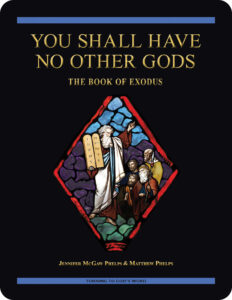 You Shall Have No Other Gods:
You Shall Have No Other Gods:
The Book of Exodus
Lesson 18 Practical Application of the Law of the Covenant
the book of Exodus 21:1—23:19
Revised Standard Version Catholic Edition (RSVCE)*
New American Bible Revised Edition (NABRE)*
Catechism of the Catholic Church
ex libris (in our library)
Evangelium Vitae (The Gospel of Life)
glossary for the book of Exodus
cross references in the book of Exodus
next lesson: The Blood of the Covenant
This material coordinates with Lesson 18 on pages 86–91 in the study book You Shall Have No Other Gods: The Book of Exodus.
And God spoke all these words, saying, ‘I am the LORD your God, who brought you out of the land of Egypt, out of the house of bondage. You shall have no other gods before me. You shall not make for yourself a graven image, or any likeness of anything that is in heaven above, or that is in the earth beneath, or that is in the water under the earth; you shall not bow down to them or serve them; for I the LORD your God am a jealous God, visiting the iniquity of the fathers upon the children to the third and the fourth generation of those who hate me, but showing mercy to thousands of those who love me and keep my commandments.”—the book of Exodus 20:1–6
welcome to our in-depth study of the book of Exodus
We invite interested groups and individuals to check out the sample first lesson from this 28- lesson Turning to
lesson Turning to  God’s Word Catholic Bible study. These online study pages link to our free lesson video overviews, as well as to a glossary and cross references in the biblical text. Other study aids include maps, additional commentary, and prayers based on the primary Scripture in each lesson. You Shall Have No Other Gods: The Book of Exodus has been granted an imprimatur and can be purchased from our website shop. If you have a Bible-study question or comment, click on one of the “ask us your question” or “what do you think” buttons on any online study page.
God’s Word Catholic Bible study. These online study pages link to our free lesson video overviews, as well as to a glossary and cross references in the biblical text. Other study aids include maps, additional commentary, and prayers based on the primary Scripture in each lesson. You Shall Have No Other Gods: The Book of Exodus has been granted an imprimatur and can be purchased from our website shop. If you have a Bible-study question or comment, click on one of the “ask us your question” or “what do you think” buttons on any online study page.
open with prayer
It’s always wise to begin any Bible study with prayer, whether reading the Scriptures alone or meeting with others in a discussion group. You can pray using your own words or use one of the opening prayers on our website. We especially like the following:
Lord Jesus, you promised to send your Holy Spirit to teach us all things.
As we read and study your word today,
allow it to touch our hearts and change our lives. Amen.
let’s review—the book of Exodus 20:1–26
Lesson 17 The Ten Commandments provides a record of God giving Moses the laws that are binding on all of God’s people. While these commandments are familiar to Christians—and are addressed in great detail in the Catechism of the Catholic Church—the other information in the twentieth chapter of the book of Exodus often gets overlooked. At the same time that Moses is receiving the Ten Commandments, the other descendants of Jacob are backing away from the base of the mountain where the LORD’s presence is accompanied by thunder, lightning, loud trumpet blasts, and a thick cloud of smoke. This manifestation of the presence of God leads the people to ask Moses to serve as an intermediary so none of them need approach the LORD directly. Moses assures the people that they shouldn’t be afraid; the evidence of God’s presence is intended to remind them not to sin. Moses draws near to God, but the people remain at a distance. The LORD asks Moses to remind the people that they aren’t to make idols of silver or gold, and God issues specific instructions about worship.
 how Christians can follow the Ten Commandments (01:20:49)
how Christians can follow the Ten Commandments (01:20:49)
Lesson 18 is primarily historical. Turning to God’s Word  author Matthew Phelps explains that this means the biblical text is about traditions (spelled with a lowercase ‘T’), which are interpretations that applied at the time the Commandments were given. The Ten Commandments themselves, however, are Tradition (spelled with a capital ‘T’). The ordinances (tradition) that are based on the Commandments (Tradition) can change over time, but it’s not OK to ignore present-day interpretations (tradition). Practically speaking, truth isn’t relative, but it is relational. That translates to truth being at the meeting point where humanity
author Matthew Phelps explains that this means the biblical text is about traditions (spelled with a lowercase ‘T’), which are interpretations that applied at the time the Commandments were given. The Ten Commandments themselves, however, are Tradition (spelled with a capital ‘T’). The ordinances (tradition) that are based on the Commandments (Tradition) can change over time, but it’s not OK to ignore present-day interpretations (tradition). Practically speaking, truth isn’t relative, but it is relational. That translates to truth being at the meeting point where humanity  encounters God. Complexities of life are myriad, and this section of the book of Exodus looks at a few situations in which God’s people were likely to need to apply the Ten Commandments. Situations can vary and change, but God doesn’t change. In that respect, the Ten Commandments represent objective truth. It is a sin to take a life. That said, situations in which a life is taken may vary. The traditions in this section of the book of Exodus aren’t explicitly binding on us today, but the Ten Commandments are. This biblical text challenges us to think about how the Ten Commandments are manifest in our present-day world. What traditions have bearing on our lives today, and how are we at keeping them?
encounters God. Complexities of life are myriad, and this section of the book of Exodus looks at a few situations in which God’s people were likely to need to apply the Ten Commandments. Situations can vary and change, but God doesn’t change. In that respect, the Ten Commandments represent objective truth. It is a sin to take a life. That said, situations in which a life is taken may vary. The traditions in this section of the book of Exodus aren’t explicitly binding on us today, but the Ten Commandments are. This biblical text challenges us to think about how the Ten Commandments are manifest in our present-day world. What traditions have bearing on our lives today, and how are we at keeping them?
The Scripture ranges for the videos that accompany this Catholic Bible study from Turning to God’s Word match the Scripture ranges for the sets of questions in You Shall Have No Other Gods: The Book of Exodus. You can follow along as Turning to God’s Word author Matthew Phelps discusses Lesson 18, “Practical Application of the Law of the Covenant,” on pages 86–91 in the study book.
what is an ordinance?
How does an ordinance differ from one of the Ten Commandments? In the book of Exodus 21:1, God describes how his people are to apply his law to situations they’re likely to encounter, and he calls these applications ordinances. A vocabulary box on page 67 in Lesson 13, “Song of Moses & Song of Miriam,” in You Shall Have No Other Gods: The Book of Exodus defines ordinance as an order or decree, or a prescribed religious rite. The ordinances that the LORD issues in this section of the book of Exodus function much like we think of a covenant in that each party is required to do something for the other, but these new ordinances aren’t binding in the same way that the Ten Commandments are.
Instead, they describe different aspects of how God’s people are to apply the commandments to practical events likely to occur at the time the book of Exodus was written. Since then, the situations most Christians find themselves in have changed. Few of us own oxen or slaves, for example. The intent of the Ten Commandments remains binding, however. We’re responsible for any animals that we own, pets, for example, and we remain required to honor the dignity of all other human beings.
read the Catechism—the Ten Commandments are binding
In case anyone is even slightly confused about the mandatory nature of the Ten Commandments, the Catechism of the Catholic Church devotes Section Two—paragraphs 2052 through 2557—to explaining how the Ten Commandments are to be followed by Catholics. Paragraph 2068 in the Catechism of the Catholic Church is explicit in insisting that the Ten Commandments must be respected and followed by all Christians.
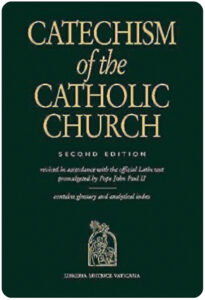 2068 The Council of Trent teaches that the Ten Commandments are obligatory for Christians and that the justified man is still bound to keep them; the Second Vatican Council confirms: “The bishops, successors of the apostles, receive from the Lord … the mission of teaching all peoples, and of preaching the Gospel to every creature, so that all men may attain salvation through faith, Baptism, and the observance of the Commandments.”
2068 The Council of Trent teaches that the Ten Commandments are obligatory for Christians and that the justified man is still bound to keep them; the Second Vatican Council confirms: “The bishops, successors of the apostles, receive from the Lord … the mission of teaching all peoples, and of preaching the Gospel to every creature, so that all men may attain salvation through faith, Baptism, and the observance of the Commandments.”
read the first printing of the Catechism—an example of a change in tradition
At the time that the Catechism of the Catholic Church first was published in 1992, Church teaching about capital punishment allowed for it under very specific and limited instances. Paragraph 2267 in the Catechism of the Catholic Church originally read:
2267 (1992) Assuming that the guilty party’s identity and responsibility have been fully determined, the traditional teaching of the Church does not exclude recourse to the death penalty, if this is the only possible way of effectively defending human lives against the unjust aggressor.
If, however, non-lethal means are sufficient to defend and protect people’s safety from the aggressor, authority will limit itself to such means, as these are more in keeping with the concrete conditions of the common good and more in conformity with the dignity of human persons.
Today, in fact, as a consequence of the possibilities which the state has for preventing crime, by rendering one who has committed an offense incapable of doing harm—without definitively taking away from him the possibility of redeeming himself—the cases in which  the execution of the offender is an absolute necessity “are very rare, if not practically non-existent.” [Editor’s note: The quotation in the last sentence is from Evangelium Vitae (The Gospel of Life) by Pope St. John Paul II. You can read other writings by recent popes at ex libris—magisterial documents.]
the execution of the offender is an absolute necessity “are very rare, if not practically non-existent.” [Editor’s note: The quotation in the last sentence is from Evangelium Vitae (The Gospel of Life) by Pope St. John Paul II. You can read other writings by recent popes at ex libris—magisterial documents.]
read the current Catechism—The updated Paragraph 2267 in the Catechism of the Catholic Church now leaves no room for doubt about how Christians are to regard capital punishment:
 2267 (updated in 2018) Recourse to the death penalty on the part of legitimate authority, following a fair trial, was long considered an appropriate response to the gravity of certain crimes and an acceptable, albeit extreme, means of safeguarding the common good.
2267 (updated in 2018) Recourse to the death penalty on the part of legitimate authority, following a fair trial, was long considered an appropriate response to the gravity of certain crimes and an acceptable, albeit extreme, means of safeguarding the common good.
Today, however, there is an increasing awareness that the dignity of the person is not lost even after the commission of very serious crimes. In addition, a new understanding has emerged of the significance of penal sanctions imposed by the state. Lastly, more effective systems of detention have been developed, which ensure the due protection of citizens but, at the same time, do not definitively deprive the guilty of the possibility of redemption.
Consequently, the Church teaches, in the light of the Gospel, that “the death penalty is inadmissible because it is an attack on the inviolability and dignity of the person”, and she works with determination for its abolition worldwide. [Editor’s note: The quotation in the last sentence is from Pope Francis.]
do you know the difference between restitution & repentance?
One thing that the ordinances in this section of the book of Exodus do is establish the importance of both restitution and repentance.
 ? What evidence can be found in the biblical text that suggests God wishes to place limits or boundaries on how his laws are to be carried out?
? What evidence can be found in the biblical text that suggests God wishes to place limits or boundaries on how his laws are to be carried out?
? What are the overarching areas covered by such limitations?
? Give some examples of how punishment represents violence against the perpetrator of a crime.
? Why might the LORD wish to limit how much punishment befalls a person who wrongs another?
? Explain why both restitution and repentance are needed to restore a relationship that’s been harmed by sin.
? Consider what might be the best antidote for failing to do enough to repair a broken relationship.
? In addition to other people, who else is it possible for us to harm when we fail to honor God’s law?
what’s going on with first-born sons belonging to God?
In the book of Exodus 22:29b–30, the LORD claims that first-born sons are to be given to him. This passage represents a type of original sin, but it often confuses readers. While original sin is based on the sin of Adam and Eve in the Garden of Eden, described in the third chapter of the book of Genesis,  there’s nothing in the Old Testament that clearly labels original sin as such. At this point in the Israelites’ relationship with God, original sin isn’t spelled out. You can learn more in the Turning to God’s Word Catholic Bible study In the Beginning: The Book of Genesis.
there’s nothing in the Old Testament that clearly labels original sin as such. At this point in the Israelites’ relationship with God, original sin isn’t spelled out. You can learn more in the Turning to God’s Word Catholic Bible study In the Beginning: The Book of Genesis.
what Matthew says—Christianity provides a way to counter original sin
The concept of original sin begins to develop as we know it when Paul addresses the idea in his New  Testament Letter to the Romans 5:12–13: “Therefore as sin came into the world through one man and death through sin, and so death spread to all men because all men sinned—sin indeed was in the world before the law was given, but sin is not counted where there is no law.” Turning to God’s Word author Matthew Phelps points out that the book of Exodus provides a precursor to the idea that just by being born, a person (any person, not merely a first-born male) can be doomed. The first-born males specified in the book of Exodus can be considered to be representative of all humanity. The LORD sets the stage for the possibility of offering a life in exchange for the life that’s doomed, which is what Jesus’ sacrifice is all about.
Testament Letter to the Romans 5:12–13: “Therefore as sin came into the world through one man and death through sin, and so death spread to all men because all men sinned—sin indeed was in the world before the law was given, but sin is not counted where there is no law.” Turning to God’s Word author Matthew Phelps points out that the book of Exodus provides a precursor to the idea that just by being born, a person (any person, not merely a first-born male) can be doomed. The first-born males specified in the book of Exodus can be considered to be representative of all humanity. The LORD sets the stage for the possibility of offering a life in exchange for the life that’s doomed, which is what Jesus’ sacrifice is all about.
death—you could look it up in our archives
The most significant fact about the LORD certainly is his power over life and death.  Lesson 18 focuses on practical applications of the Ten Commandments; issues of life and death govern how God’s people are to keep his law. To learn more about what the Apostle Paul mean by his use of the word “death” in the eighth chapter of the Letter to the Romans, read Lost in Translation, an online column in which Turning to God’s Word author Matthew Phelps helps readers connect with ideas expressed in the original languages of the Scriptures. New Lost in Translation entries are posted on Mondays, and past entries are archived on our website. Contact us if you’d like to receive Lost in Translation by email every week.
Lesson 18 focuses on practical applications of the Ten Commandments; issues of life and death govern how God’s people are to keep his law. To learn more about what the Apostle Paul mean by his use of the word “death” in the eighth chapter of the Letter to the Romans, read Lost in Translation, an online column in which Turning to God’s Word author Matthew Phelps helps readers connect with ideas expressed in the original languages of the Scriptures. New Lost in Translation entries are posted on Mondays, and past entries are archived on our website. Contact us if you’d like to receive Lost in Translation by email every week.
ex libris—two books about spiritual direction
Two of the best books we’ve recently come across that discuss the practical ins and outs of 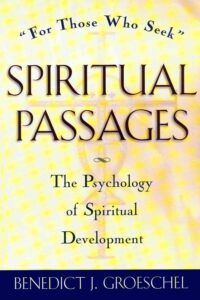
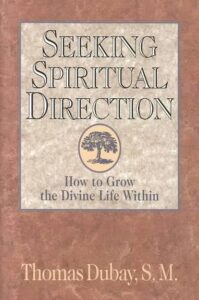 discernment are Spiritual Passages by Benedict Groeschel, C.F.R., and Seeking Spiritual Direction by Thomas Dubay, S.M.
discernment are Spiritual Passages by Benedict Groeschel, C.F.R., and Seeking Spiritual Direction by Thomas Dubay, S.M.  Both authors have written other excellent books as well, but people interested in learning more about spiritual direction may find these two titles particularly insightful. At ex libris—main bookshelf, you can read excerpts from both of these books by Catholic priests, and you also can learn more about other works related to Catholic Bible study.
Both authors have written other excellent books as well, but people interested in learning more about spiritual direction may find these two titles particularly insightful. At ex libris—main bookshelf, you can read excerpts from both of these books by Catholic priests, and you also can learn more about other works related to Catholic Bible study.
t he best Catholic commentary about Scripture
he best Catholic commentary about Scripture
To find out more about how Church teaching is supported by Scripture passages in You Shall Have No Other Gods: The Book of Exodus, check out the Index of Citations in the Catechism of the Catholic Church. Links (Revised Standard Version Catholic Edition [RSVCE*]) to the primary Scripture passages in the lesson and relevant paragraphs in the Catechism are provided here. Not every passage in the biblical text for this Catholic study is referenced in a Catechism paragraph, however.
the book of Exodus 22:20–22—paragraph 1867
the book of Exodus 23:7—paragraph 2261
the book of Exodus 23:12—paragraph 2172
ways our glossary might prove helpful
In addition to providing extra information about geographical locations, our glossary also points out  when a person or place is mentioned in the biblical text under more than one name or more than one spelling. If you can remember a name but aren’t sure in which lesson it shows up, you can find it in the glossary, which lists every proper noun that appears in the biblical text for every lesson in You Shall Have No Other Gods: The Book of Exodus.
when a person or place is mentioned in the biblical text under more than one name or more than one spelling. If you can remember a name but aren’t sure in which lesson it shows up, you can find it in the glossary, which lists every proper noun that appears in the biblical text for every lesson in You Shall Have No Other Gods: The Book of Exodus.
to learn more, read more Scripture
If you’re having difficulty with a particular passage of Scripture, it can be helpful to read the relevant  cross references—but looking these up can take time. To make that easier, we’ve compiled the cross references from the Revised Standard Version Second Catholic Edition (RSV2CE)—the translation that we reprint in our study books. That list can be found at the top of every online study page accompanying this study, and it includes links to each of the cross references in the primary biblical text for You Shall Have No Other Gods: The Book of Exodus.
cross references—but looking these up can take time. To make that easier, we’ve compiled the cross references from the Revised Standard Version Second Catholic Edition (RSV2CE)—the translation that we reprint in our study books. That list can be found at the top of every online study page accompanying this study, and it includes links to each of the cross references in the primary biblical text for You Shall Have No Other Gods: The Book of Exodus.
don’t forget about our indexes & extra online material

 If you’re trying to locate information about a specific Scripture passage, you can look it up in the index at the back of the study book or sample lesson. If you want to find a particular commentary, you can look up its title in the topics index. To learn more about another book of the Bible for which there’s a Turning to God’s Word study, visit the online study directories to read the commentaries and watch any accompanying videos. Finally, if you have a question or would like to make a comment about any of our studies, you can use one of the “ask us your question” or “what do you think” buttons to email our authors.
If you’re trying to locate information about a specific Scripture passage, you can look it up in the index at the back of the study book or sample lesson. If you want to find a particular commentary, you can look up its title in the topics index. To learn more about another book of the Bible for which there’s a Turning to God’s Word study, visit the online study directories to read the commentaries and watch any accompanying videos. Finally, if you have a question or would like to make a comment about any of our studies, you can use one of the “ask us your question” or “what do you think” buttons to email our authors.
ex libris—Church documents & books about religious topics
Link to magisterial documents referred to in our Bible studies at ex libris—magisterial documents.  This listing includes significant recent encyclicals as well as a number of historical Church documents. Recommended books related to Scripture study can be found at ex libris—main bookshelf.
This listing includes significant recent encyclicals as well as a number of historical Church documents. Recommended books related to Scripture study can be found at ex libris—main bookshelf.
wondering how to pronounce some of these words?
The following link is to a reading from the New International Version (NIV) Bible. To listen, open the link and click on the audio icon above the printed text. Although not taken from the translations used in our study materials, the NIV reading provides an audio guide to pronunciation of words in this lesson’s primary biblical text. A close online version of the translation of the Bible used in Catholic liturgy in the United States as well as an audio guide for daily Mass readings for the current month can be found on the website of the United States Conference of Catholic Bishops (USCCB).
the book of Exodus 21:1—23:19 (NIV)
 close with Bible-based prayer related to this lesson
close with Bible-based prayer related to this lesson
Many of our Catholic study groups like to conclude their discussions with a prayer based on the scriptural focus of their lesson, and some participants include Scripture-specific prayer in their individual study. If you’re uncomfortable composing your own Bible-based prayers, you can follow our four easy steps. If you prefer, you can use the following short prayer based on this lesson’s text from the book of Exodus.
O God, you provided Moses with examples
of meaningful ways that the Israelites could apply
the Ten Commandments in their everyday lives.
Enable us to respect your commandments
and always seek to follow them.
We ask this in the name of Jesus Christ,
who perfectly adhered to your will in order to demonstrate
the full extent of your divine love for us. Amen.
Lesson 19 The Blood of the Covenant, the book of Exodus 23:20—24:18
Lesson 17 The Ten Commandments, the book of Exodus 20:1–26
you also may like our two-part study of the prophets
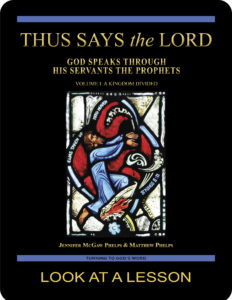
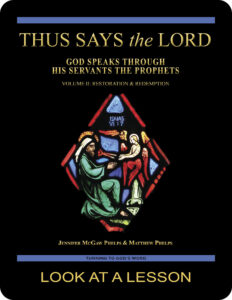 Thus Says the LORD: God Speaks Through His Servants the Prophets—Volume I: A Kingdom Divided examines the prophets in their historical context using the First and Second Books of the Kings and other Old Testament passages written before the Babylonian Exile in 586 B.C. Volume II: Restoration & Redemption looks at the post-exilic prophets. This 51-lesson Catholic Bible study builds on The United Kingdom of Israel: Saul, David & Solomon Foreshadow Christ the King. Click on the books’ covers to view a sample lesson from each volume.
Thus Says the LORD: God Speaks Through His Servants the Prophets—Volume I: A Kingdom Divided examines the prophets in their historical context using the First and Second Books of the Kings and other Old Testament passages written before the Babylonian Exile in 586 B.C. Volume II: Restoration & Redemption looks at the post-exilic prophets. This 51-lesson Catholic Bible study builds on The United Kingdom of Israel: Saul, David & Solomon Foreshadow Christ the King. Click on the books’ covers to view a sample lesson from each volume.
start a Turning to God’s Word Bible study
 Thank you for your interest in You Shall Have No Other Gods: The Book of Exodus.
Thank you for your interest in You Shall Have No Other Gods: The Book of Exodus.  Information about beginning a Turning to God’s Word Bible study can be found at start a Bible study. Tami, Matthew, and I are available to answer your questions and to offer support. You may use this email to contact us directly if you’re interested in starting a Turning to God study or in having your study schedule listed with other TtGW study groups on our website. —Jennifer
Information about beginning a Turning to God’s Word Bible study can be found at start a Bible study. Tami, Matthew, and I are available to answer your questions and to offer support. You may use this email to contact us directly if you’re interested in starting a Turning to God study or in having your study schedule listed with other TtGW study groups on our website. —Jennifer
*There are seven deuterocanonical books in the Old Testament—the Books of Tobit, Judith, Wisdom, Sirach, Baruch, and First and Second Maccabees, as well as some passages in the Books of Esther and Daniel. Protestants usually refer to these works as “apocryphal,” a word that means “outside the (Protestant) canon” because they’re excluded from most Protestant Bibles. The word “deuterocanonical” means “second canon”; Catholics use that word to refer to any section of the Catholic Old Testament for which there are no extant, or existing, Hebrew manuscripts. All of the deuterocanonical books appear in the Septuagint, the earliest remaining versions of which date to the 1st century B.C. This Greek translation of the Old Testament was in common use by Jews at the time of Jesus—but the same books aren’t found in existing Hebrew manuscripts, which aren’t as old as the oldest version of the Septuagint. Learn more by reading How Do Catholic & Protestant Bibles Differ?
Turning to God’s Word printed Bible studies use the 2006 Revised Standard Version Second Catholic Edition (RSV2CE) translation for all Scripture references except those to the Psalms, which are taken from The Abbey Psalms and Canticles, prepared by the Benedictine monks of Conception Abbey and published in 2020 by the United States Conference of Catholic Bishops (USCCB). All Scripture links for the online study pages for You Shall Have No Other Gods: The Book of Exodus are to the 1966 Revised Standard Version Catholic Edition (RSVCE) translation. The New International Version (NIV) audio recordings follow the same chapter and verse numbering as the RSV Catholic translations, but the NIV translation doesn’t include the deuterocanonical books and passages.
The 1966 RSVCE uses archaic pronouns and verb forms such as “thee,” “thou,” “didst” in the Psalms and in direct quotations attributed to God. The 2006 RSV2CE replaces those with more accessible English. The few significant translation changes in the RSV2CE include rendering almah as “virgin” in the Book of Isaiah 7:14 and restoring the term “begotten” in the Gospel According to John 3:16.
Numbering varies for some passages in this Bible study. Turning to God’s Word studies (print and digital) follow the numbering in the Revised Standard Version Catholic translations (RSV2CE and RSVCE). Discrepancies in the New American Bible Revised Edition (NABRE) are noted in the Index of Scripture Citations in the study book and the online sample.
 You can learn more about the Psalms by viewing a sample lesson from the Turning to God’s Word Catholic Bible study Sing a New Psalm: Communicating with God Through the Prayers of the Church—Volume I: Lauds & Vespers. The second part of that study, Sing a New Psalm: Communicating with God Through the Prayers of the Church—Volume II: Vigils, Day Prayer & Compline, is scheduled for publication in 2025. Some verse numbers may vary in different translations of the Psalms.
You can learn more about the Psalms by viewing a sample lesson from the Turning to God’s Word Catholic Bible study Sing a New Psalm: Communicating with God Through the Prayers of the Church—Volume I: Lauds & Vespers. The second part of that study, Sing a New Psalm: Communicating with God Through the Prayers of the Church—Volume II: Vigils, Day Prayer & Compline, is scheduled for publication in 2025. Some verse numbers may vary in different translations of the Psalms.
